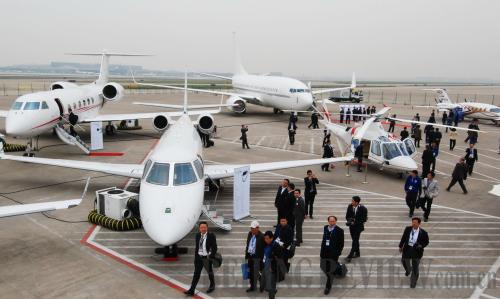|
 |
|
GRAND EVENT: The Shanghai International Business Aviation Show 2011 opens on April 13, with more than 100 jet manufacturers, ground service providers, maintenance operators and training providers attending the show and 30 luxury business jets on display (CFP) |
Numbers of the Week
12.79 billion yuan
China Everbright Bank Co. said its net profit jumped 67.4 percent year on year to 12.79 billion yuan ($1.96 billion) in 2010, boosted by higher interest margins and commissions.
89.7 billion yuan
China's 77 largest steelmakers earned combined net profits of 89.7 billion yuan ($13.7 billion) in 2010, said the China Iron and Steel Association.
TO THE POINT: The IMF points to a promising outlook for the Chinese economy, though uncertainties still loom large. The auto market cools down, with March sales growing a minuscule 5.36 percent year on year. Chinese property developers have received a blow to their war chests, as sales plunge and borrowing costs climb. Chinese funds have experienced a dramatic drop in profits last year due to bearish stock markets. The country's economic take-off fuels a wealth boom with the number of millionaires increasing.
By HU YUE
IMF Optimistic
After growing by 10.3 percent in 2010, China's economic growth is expected to remain robust at 9.6 percent this year, with the drivers of growth shifting from public to private demand, said the International Monetary Fund (IMF), in its latest World Economic Outlook.
"Consumption will be buttressed by rapid credit growth, supportive labor market conditions, and continued policy efforts to raise household disposable income," said the IMF.
Meanwhile, continued reforms to raise consumption in the country, including efforts to expand pension and health care coverage and to develop the financial sector, will also be key ingredients of a comprehensive rebalancing package.
"The strong growth in China will continue to help the rest of Asia tide over the economic downturn," said IMF economist Abdul Abiad.
There is still concern in China that management of credit aggregates, used to exercise macroeconomic control, is being undermined by bank's financial innovations and off-balance-sheet activities.
Globally, the economic recovery is becoming stronger but new downside risks are building on account of commodity prices, notably for oil, and geopolitical uncertainty, as well as overheating and booming asset markets in emerging market economies, said the IMF.
"Another main worry in advanced economies, after an initial recovery driven by inventory cycle and fiscal stimulus, was growth would fizzle," said IMF chief economist Olivier Blanchard.
"Inflation may well be higher for some time but, as our forecasts suggest, we do not expect a major adverse effect on growth," he added.
Auto Gloom
After a year of breakneck growth, China's auto market is losing steam.
Auto sales across the nation totaled 1.828 million units in March, up 5.36 percent year on year, compared with growth of 56 percent in the same period last year, said the China Association of Automobile Manufacturers (CAAM).
The March output also stood at 1.827 million units, moderately rising 5.34 percent from the previous year.
March has historically been a peak period for car sales in China, so the March data were beyond expectations, said the CAAM.
The association attributed the slowdown to the end of policy incentives and new limits on car purchases in Beijing.
The government this year scaled back supportive measures, including a favorable purchase tax for smaller cars, subsidies to rural buyers and an old car replacement program.
Rising oil prices and the devastating earthquake in Japan disrupted global supplies of auto parts.
How the disaster in Japan will impact China's auto industry has yet to be assessed, but the ripple effect should not be underestimated, said CAAM.
"Many automakers are likely to experience a decline in profits this year, and some may even struggle to make ends meet," said Dong Yang, Secretary General of the CAAM.
"The consolation is that the difficulties could provide a catalyst for the industry to press ahead with branding and technological innovation," he said.
Financially Starved
Clouds are gathering over the real estate market as property developers experience financing strains.
The operating net cash flow of the 84 listed Chinese property developers had stood at -70.59 billion yuan (-$10.79 billion) by the end of 2010, decreasing by 115 billion yuan ($17.7 billion) from that in 2009, according to data from the Wind Information Co. Ltd.
As the domestic monetary environment tightens and home sales nose-dive, the developers are coming under growing financial pressure to lower prices, said Yang Hongxu, a senior analyst with the E-house China Research and Development Institute.
Since 2010, the People's Bank of China, the central bank, has raised interest rates four times and hiked the ratio of deposits commercial banks must set aside in reserve nine times.
"The balance sheet of China's property developers will become tighter as most of them rely heavily on sales proceeds to service large land payments," said Zhuang Jian, an economist with the Asian Development Bank, China Office.
"Financing of developers is a key factor to impact house prices," said Chen Zhi, Deputy Secretary General of Beijing Real Estate Association. "An encouraging sign is many developers are offering discounts to lure buyers."
In search of a source of capital, many property companies are looking beyond China's borders. Chinese developers have raised more than $3 billion in overseas bond markets, said the credit rating agency Standard & Poor (S&P).
Bond sales could only temporarily improve liquidity, and aggressive developers that have relied on borrowing to fund growth could be at risk as measures to cool the housing market start to bite, it said.
"Rising leverage and volatility in the real estate market are a risky combination for developers," said S&P credit analyst Bei Fu, "The companies' liquidity could come under pressure if transaction volumes or average selling prices dramatically drop."
Those developers that have acquired expensive land at the peak of the market cycle are particularly vulnerable, said Fu.
| 